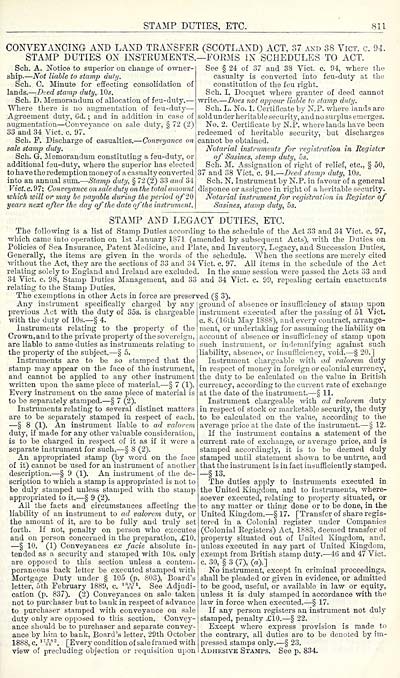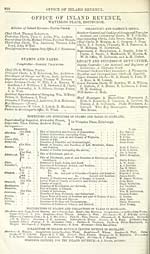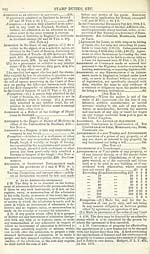Download files
Complete book:
Individual page:
Thumbnail gallery: Grid view | List view

STAMP DUTIES, ETC.
811
CONVEYANCING AND LAND TRANSFER (SCOTLAND) ACT, 37 axd 38 Vict. c. 94.
STx\MP DUTIES ON INSTRUMENTS
Sch. A. Notice to superior on change of owner-
ship. — Not liable to stamp duty.
Sch. 0. Minute for effecting consolidation of
lands. — -Dted stamp duty, IQs.
Sch. D. Memorandum of allocation of feu-duty. —
Where there is no augmentation of feu-duty —
Agreement dutj', Gd. ; and in addition in case of
augmentation — Conveyance on sale duty, § 72 (2)
33 and o4 Vict. c. 97.
Sch. F. Discharge of casualties. — Conveyance on
sale stamp duty.
Sch. G. Memorandum constituting a feu-duty, or
additional feu-duty, where the superior has elected
to have tho redemption money of a casualty converted
into an annual sum. — Stamp duty, § 72 (2) 33 and 3-1
Vict. c. 97; Conveyance on sale duty on the total amount
which will or may he payable during the period ofiQ
years next after the day of the date of the instrument.
FORMS IN SCHEDULES TO ACT.
See § 24 of 37 and 38 Vict. c. 94, where the
casualty is converted into feu-duty at tho
constitution of the feu right.
Sch. I. Docquet where granter of deed cannot
write. — Does not appear liable to stamp duty.
Sch. L. No. 1. Certificate by N.P. where lands are
sold under heritable security, and no surplus emerges.
No. 2. Certificate by N.P. where lands have been
redeemed of heritable security, but discharges
cannot be obtained.
Notarial instruments for registration in Register
of Sasines, stamp duty, iis.
Sch. M. Assignation of right of relief, etc., § 50,
37 and 38 Vict. c. 91. — Deed stamp duty, 10s.
Sch. N. Instrument by N.P. in favour of a general
disponee or assignee in right of a heritable security.
Notarial instrument for registration in Register of
Sasines, stamp duty, 5s.
STAMP AND LEGACY DUTIES, ETC.
The following is a list of Stamp Duties according to the schedule of the Act 33 and 34 Vict. c. 97,
which came into operation on 1st Januai'y 1871 (amended by subsequent Acts), with the Duties on
Policies of Sea Insurance, Patent Medicine, and Plate, and Inventory, Legacy, and Succession Duties,
Generally, the items are given in the words of the schedule. When the sections are merely cited
without the Act, they are the sections of 33 and 34 Vict. c. 97. All items in tho schedule of the Act
relating solely to England and Ireland are excluded. In the same session were passed the Acts 33 and
34 Vict. c. 98, Stamp Duties Management, and 33 and 34 Vict. c. 99, repealing certain enactments
relating to the Stamp Duties.
The exemptions in other Acts in force are preserved (§ 3).
Any instrument specifically charged by any
previous Act with the duty of 35s. is chargeable
with the duty of 10s. — § 4.
Instruments relating to the property of the
Crown, and to the private property of the sovereign,
are liable to same duties as instruments relating to
the property of the subject. — § 5.
Instruments are to be so stamped that the
stamp may appear on the face of the instrument,
and cannot be applied to any other instrument
written upon the same piece of material. — § 7 (1).
Every instrument on the same piece of material is
to be separately stamped. — § 7 (2).
Instruments relating to several distinct matters
are to be separately stamped in respect of each.
— § 8 (1). An instrument liable to ad valorem
duty, if made for any other valuable consideration,
is to be charged in respect of it as if it were a
separate instrument for such. — § 8 (2).
An appropriated stamp (by word on the face
of it) cannot be used for an instrument of another
description. — § 9 (1). An instrument of the de-
scription to which a stamp is appropriated is not to
be duly stamped unless stamped with the stamp
appropriated to it. — § 9 (2).
All the facts and circumstances affecting the
liability of an instrument to ad valorem duty, or
the amount of it, are to be fully and truly set
forth. If not, penalty on person who eiiecutes
and on person concerned in the preparation, £10.
— § 10. (1) Conveyances ex facie absolute in-
tended as a security and stamped with 10s. only
are opposed to this section unless a contem-
poraneous back letter be executed stamped with
Mortgage Duty under § 105 (p. 803), Board's
letter, o'th February 1889, c. "aV^ See Adjudi-
cation (p. 837). (2) Conveyances on sale taken
not to purchaser but to bank in respect of advance
to purchaser stamped with conveyance on sale
duty only are opposed to this section. Oonve}--
ance should be to pm-chaser and separate convey-
ance by him to bank. Board's letter, 29th October
1888, c. 'W". [Every conditionofsaleframed with
view of precluding objection or requisition upon
round of absence or insufficiency of stamp upon
instrument executed after the passing of 51 Vict,
c. 8. (lOth May 1888), and every contract, arrange-
ment, or undertaking for assuming the liability on
account of absence or insufficiency of stamp upon
such instrument, or indemnifying against such
liability, absence, or insufficiency, void. — § 20.]
Instrument chargeable with ad valorem duty
in respect of money in f oi'eign or colonial currency,
the dutj' to be calculated on the value in British
currency, according to the current rate of exchange
at the date of the iustrument. — § 11.
Instrument chargeable with ad valorem duty
in respect of stock or marketable security, the duty
to be calculated on the value, according to the
average price at the date of the instrument. — § 12.
If the instrument contains a statement of tho
current rate of exchange, or average price, and is
stamped accordingly, it is to be deemed duly
stamped until statement shown to be untrue, and
that the instrument is in fact insufficiently stamped.
-§ 13.
The duties apply to instruments executed in
the United Kingdom, and to instruments, where-
soever executed, relating to property situated, or
to any matter or thing done or to be done, in the
United Kingdom. — § 17. [Transfer of share regis-
tered in a Colonial register under Compaidos
(Colonial Kegisters) Act, 1883, deemed transfer of
property situated out of United Kingdom, and,
unless executed in any part of United Kingdom,
exempt from British stamp duty. — 46 and 47 Vict,
c. 30, § 3 (7), (a).]
No instrument, except in criminal proceedings,
shall be pleaded or given in evidence, or admitted
to be good, useful, or available in law or equity,
unless it is duly stamped in accordance with the
law in force when executed. — § 17.
If any person registers an instrument not duly
stamped, penalty £10. — § 22.
Except where express provision is made to
the contrary, all duties are to be denoted by im-
pressed stamps only. — § 23.
Adhesive Stamps. See p. 834.
811
CONVEYANCING AND LAND TRANSFER (SCOTLAND) ACT, 37 axd 38 Vict. c. 94.
STx\MP DUTIES ON INSTRUMENTS
Sch. A. Notice to superior on change of owner-
ship. — Not liable to stamp duty.
Sch. 0. Minute for effecting consolidation of
lands. — -Dted stamp duty, IQs.
Sch. D. Memorandum of allocation of feu-duty. —
Where there is no augmentation of feu-duty —
Agreement dutj', Gd. ; and in addition in case of
augmentation — Conveyance on sale duty, § 72 (2)
33 and o4 Vict. c. 97.
Sch. F. Discharge of casualties. — Conveyance on
sale stamp duty.
Sch. G. Memorandum constituting a feu-duty, or
additional feu-duty, where the superior has elected
to have tho redemption money of a casualty converted
into an annual sum. — Stamp duty, § 72 (2) 33 and 3-1
Vict. c. 97; Conveyance on sale duty on the total amount
which will or may he payable during the period ofiQ
years next after the day of the date of the instrument.
FORMS IN SCHEDULES TO ACT.
See § 24 of 37 and 38 Vict. c. 94, where the
casualty is converted into feu-duty at tho
constitution of the feu right.
Sch. I. Docquet where granter of deed cannot
write. — Does not appear liable to stamp duty.
Sch. L. No. 1. Certificate by N.P. where lands are
sold under heritable security, and no surplus emerges.
No. 2. Certificate by N.P. where lands have been
redeemed of heritable security, but discharges
cannot be obtained.
Notarial instruments for registration in Register
of Sasines, stamp duty, iis.
Sch. M. Assignation of right of relief, etc., § 50,
37 and 38 Vict. c. 91. — Deed stamp duty, 10s.
Sch. N. Instrument by N.P. in favour of a general
disponee or assignee in right of a heritable security.
Notarial instrument for registration in Register of
Sasines, stamp duty, 5s.
STAMP AND LEGACY DUTIES, ETC.
The following is a list of Stamp Duties according to the schedule of the Act 33 and 34 Vict. c. 97,
which came into operation on 1st Januai'y 1871 (amended by subsequent Acts), with the Duties on
Policies of Sea Insurance, Patent Medicine, and Plate, and Inventory, Legacy, and Succession Duties,
Generally, the items are given in the words of the schedule. When the sections are merely cited
without the Act, they are the sections of 33 and 34 Vict. c. 97. All items in tho schedule of the Act
relating solely to England and Ireland are excluded. In the same session were passed the Acts 33 and
34 Vict. c. 98, Stamp Duties Management, and 33 and 34 Vict. c. 99, repealing certain enactments
relating to the Stamp Duties.
The exemptions in other Acts in force are preserved (§ 3).
Any instrument specifically charged by any
previous Act with the duty of 35s. is chargeable
with the duty of 10s. — § 4.
Instruments relating to the property of the
Crown, and to the private property of the sovereign,
are liable to same duties as instruments relating to
the property of the subject. — § 5.
Instruments are to be so stamped that the
stamp may appear on the face of the instrument,
and cannot be applied to any other instrument
written upon the same piece of material. — § 7 (1).
Every instrument on the same piece of material is
to be separately stamped. — § 7 (2).
Instruments relating to several distinct matters
are to be separately stamped in respect of each.
— § 8 (1). An instrument liable to ad valorem
duty, if made for any other valuable consideration,
is to be charged in respect of it as if it were a
separate instrument for such. — § 8 (2).
An appropriated stamp (by word on the face
of it) cannot be used for an instrument of another
description. — § 9 (1). An instrument of the de-
scription to which a stamp is appropriated is not to
be duly stamped unless stamped with the stamp
appropriated to it. — § 9 (2).
All the facts and circumstances affecting the
liability of an instrument to ad valorem duty, or
the amount of it, are to be fully and truly set
forth. If not, penalty on person who eiiecutes
and on person concerned in the preparation, £10.
— § 10. (1) Conveyances ex facie absolute in-
tended as a security and stamped with 10s. only
are opposed to this section unless a contem-
poraneous back letter be executed stamped with
Mortgage Duty under § 105 (p. 803), Board's
letter, o'th February 1889, c. "aV^ See Adjudi-
cation (p. 837). (2) Conveyances on sale taken
not to purchaser but to bank in respect of advance
to purchaser stamped with conveyance on sale
duty only are opposed to this section. Oonve}--
ance should be to pm-chaser and separate convey-
ance by him to bank. Board's letter, 29th October
1888, c. 'W". [Every conditionofsaleframed with
view of precluding objection or requisition upon
round of absence or insufficiency of stamp upon
instrument executed after the passing of 51 Vict,
c. 8. (lOth May 1888), and every contract, arrange-
ment, or undertaking for assuming the liability on
account of absence or insufficiency of stamp upon
such instrument, or indemnifying against such
liability, absence, or insufficiency, void. — § 20.]
Instrument chargeable with ad valorem duty
in respect of money in f oi'eign or colonial currency,
the dutj' to be calculated on the value in British
currency, according to the current rate of exchange
at the date of the iustrument. — § 11.
Instrument chargeable with ad valorem duty
in respect of stock or marketable security, the duty
to be calculated on the value, according to the
average price at the date of the instrument. — § 12.
If the instrument contains a statement of tho
current rate of exchange, or average price, and is
stamped accordingly, it is to be deemed duly
stamped until statement shown to be untrue, and
that the instrument is in fact insufficiently stamped.
-§ 13.
The duties apply to instruments executed in
the United Kingdom, and to instruments, where-
soever executed, relating to property situated, or
to any matter or thing done or to be done, in the
United Kingdom. — § 17. [Transfer of share regis-
tered in a Colonial register under Compaidos
(Colonial Kegisters) Act, 1883, deemed transfer of
property situated out of United Kingdom, and,
unless executed in any part of United Kingdom,
exempt from British stamp duty. — 46 and 47 Vict,
c. 30, § 3 (7), (a).]
No instrument, except in criminal proceedings,
shall be pleaded or given in evidence, or admitted
to be good, useful, or available in law or equity,
unless it is duly stamped in accordance with the
law in force when executed. — § 17.
If any person registers an instrument not duly
stamped, penalty £10. — § 22.
Except where express provision is made to
the contrary, all duties are to be denoted by im-
pressed stamps only. — § 23.
Adhesive Stamps. See p. 834.
Set display mode to: Large image | Transcription
Images and transcriptions on this page, including medium image downloads, may be used under the Creative Commons Attribution 4.0 International Licence unless otherwise stated. ![]()
| Scottish Post Office Directories > Towns > Edinburgh > Post Office Edinburgh and Leith directory > 1889-1890 > (841) |
|---|
| Permanent URL | https://digital.nls.uk/83651461 |
|---|
| Description | Directories of individual Scottish towns and their suburbs. |
|---|
| Description | Around 700 Scottish directories published annually by the Post Office or private publishers between 1773 and 1911. Most of Scotland covered, with a focus on Edinburgh, Glasgow, Dundee and Aberdeen. Most volumes include a general directory (A-Z by surname), street directory (A-Z by street) and trade directory (A-Z by trade). |
|---|


